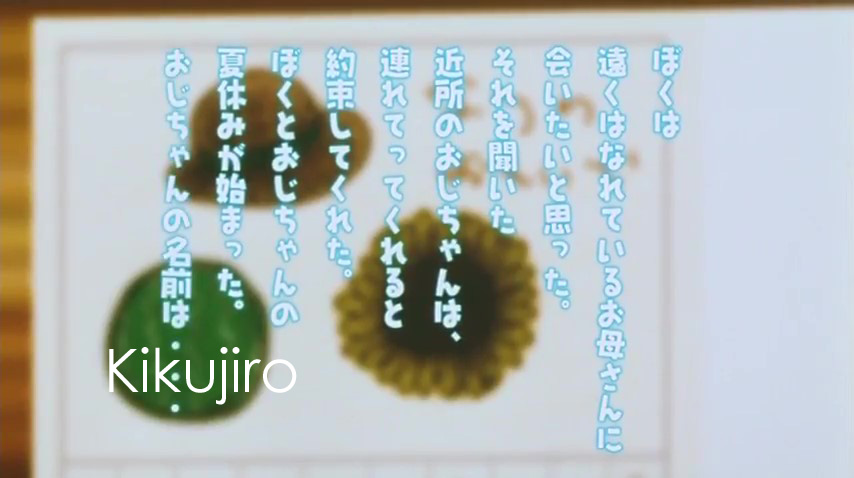
Trailer
Kikujiro
菊次郎の夏
Kikujiro

Kikujiro
Title: Kikujiro
Original title: 菊次郎の夏 Kikujirō no Natsu - Kikujiro's summer
Published: 1999
Length: 117 minutes
Staff
Director: Takeshi Kitano
Script: Takeshi Kitano
Music: Joe Hisaishi
Cast
"Beat" Takeshi Kitano: Kikujiro
Yusuke Sekiguchi: Masao
Kayoko Kishimoto: Kikujiro's wife
Yuuko Daike: Masao's mother
Great Gidayu: Biker Fatso
Rakkyo Ide: Biker Baldy
Nezumi Mamura: Traveller
Kazuko Yoshiyuki: Masao's grandmother
Kikujiro's Summer is a Japanese road movie comedy from 1999, directed by Takeshi Kitano. The director produced this gentle film as a contrast to his usual brutal gangster films.
Little Masao, who lives with his grandmother, doesn't have much to do during the summer vacation. When he finds out his mother's address, he wants to make the long way to see her on his own. But already a few streets away he is threatened by a group of bullies. The gruff good-for-nothing Kikujiro, who witnessed the scene with his wife, helps the little one. When his wife finds out about his plan, she tells his grandmother that she wants to take Masao to the sea with her. In fact, however, she sends the erratic ex-Yakuza Kikujiro with him on a trip to see his mother.
However, they end up on the velodrome first. It only continues when the two have burned down completely. Then they meet a pervert. Masao is plagued by nightmares, and his companion runs into trouble. They hitchhike and cause all kinds of damage. Kikujiro notes that Masao's mother has a new family and is a happy housewife.
He doesn't tell Masao the truth, but instead gives him a talisman. They meet other illustrious figures and sit down on the beach with two harmless idiots for a few days. Kikujiro makes up his mind to visit his own mother in the nursing home. They turn back and end up in Tokyo again. Only here does Kikujiro tells the little one his name.
The film explores alienation and inclusion in Japanese society. The main characters, and those who help them along the way, are all considered outcasts from accepted social norms, not being part of a traditional family or group structure. Characters who maintain a more accepted lifestyle are frequently at odds with the protagonists.
Early in the film, the protagonists react to their alienation with anger (Kikujiro) and sadness (Masao). Along their journey, they start to discover how alike they are and the events in Toyohashi act as a turning point from which the characters begin to find comfort in their shared isolation.
The film was nominated for Best Picture at the Japanese Academy Awards in 1999 and received awards for Best Music (Joe Hisaishi) and Best Supporting Actress (Kayoko Kishimoto). Takeshi Kitano was named Best Actor at the Valladolid International Film Festival.